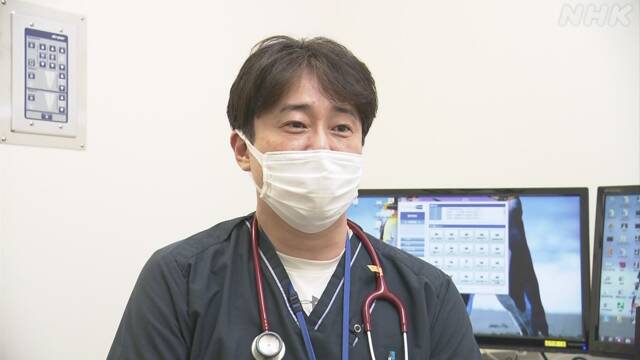Before the full-scale inoculation of the new coronavirus vaccine to children aged 5 to 11 will begin on the 26th, pediatricians will directly respond to the anxiety and confusion of parents at hospitals in Tokyo. Is underway.
Inoculation of the new coronavirus vaccine to children aged 5 to 11 will begin in Adachi-ku, Tokyo on the 26th, and will be fully implemented nationwide from next week.
Aiiku Hospital in Minato-ku, Tokyo, which specializes in maternal and child medical care, is scheduled to receive vaccinations from the 1st of next month, and according to doctors, about half of the parents who visit the outpatient department will hear voices of anxiety and confusion.
On the 24th, the mother of her 5-year-old child consulted with a doctor, saying, "I'm worried about what kind of side reactions will occur to my child, and I'm wondering about vaccination."
On the other hand, doctors explained that children tended to have a lower rate of adverse reactions than adults according to overseas data, and said, "If you are infected with corona, your parents will not be able to go to work. I think, so please take that into consideration and consult with your spouse. "
The mother said, "Even if it's unlikely, it's harder to make a decision than when I heard a case of a side reaction. It made me want to consider it positively. "
This week, we have posted a compilation of adverse reaction data published by the Centers for Disease Control and Prevention in the United States on our homepage, asking more parents to consider it based on the correct information.
Also, from next month, the local Minato Ward will start a consultation hotline that connects directly with the pediatrician of the hospital by telephone 24 hours a day in the event of a serious adverse reaction after vaccination.
Dr. Takashi Urashima, a pediatrician at Aiiku Hospital, said, "We want to respond to parents' anxieties by providing accurate information and establishing a system that allows them to receive vaccinations with greater peace of mind. , I would like to work on getting people to consider inoculation. "
70% of parents of elementary school students "I want to inoculate"
About 70% of parents of elementary school students want to receive the new coronavirus vaccine for children, but about 20% do not want to receive it because of anxiety about side reactions. However, I found out in a questionnaire conducted by a medical institution in Tokyo.
This survey was conducted by the National Center for Child Health and Development last September via the Internet, with more than 5,800 parents from 0 to 3rd grade of high school and more than 1,200 children from 1st grade to 3rd grade of high school. I got an answer.
In the survey, we asked whether children would like to receive the new corona vaccine and whether they would like to receive it, and the answers are tabulated every third grade.
Of these, when looking at the parents of elementary school students who are newly targeted for vaccination, the ages of 5 to 11 years old,
◇ "I want to receive it very much" or "I would rather receive it"
▽ A total of 71% of parents in grades 1 to 3
▽ 76% of parents in grades 4 to 6.
When I asked them to enter the reason freely, they
answered that
"the child has an underlying illness,"
"I want to see my grandparents," and
"the child wants."
On the other hand,
◇ "I don't want to receive it at all" or "I don't want to receive it at all" is
▽ 23% of parents in grades 1 to 3
▽ 20% of parents in grades 4 to 6 was.
"I would like to carefully consider whether there are any serious side reactions in the long term."
"Since it is a normal cold for children, I do not want to let them hit it for the convenience of adults."
There was a reason such as.
In addition, according to the answers of the children themselves,
◇ "I want to receive it very much" or "I would rather receive it" was
▽ 50% in the first grade to the third grade
▽ 60% in the fourth grade to the sixth grade.
In addition to voices such as "I don't want to pass on to other people" and
"If everyone receives it, my dad's work will be reduced and I can play with him again", "I'm
afraid of the eyes of society"
and so on. There were also answers that bothered me.
On the other hand,
◇ "I do not want to receive it at all" or "I do not want to receive it at all" was
▽ 42% in the first to third grades of elementary school
▽ 33% in the fourth to sixth grades.
The reasons are
"because the injection hurts" , "because it's
a vaccine made in a hurry ",
"it's scary to get a fever" , and
"because a child can get rid of it immediately".

